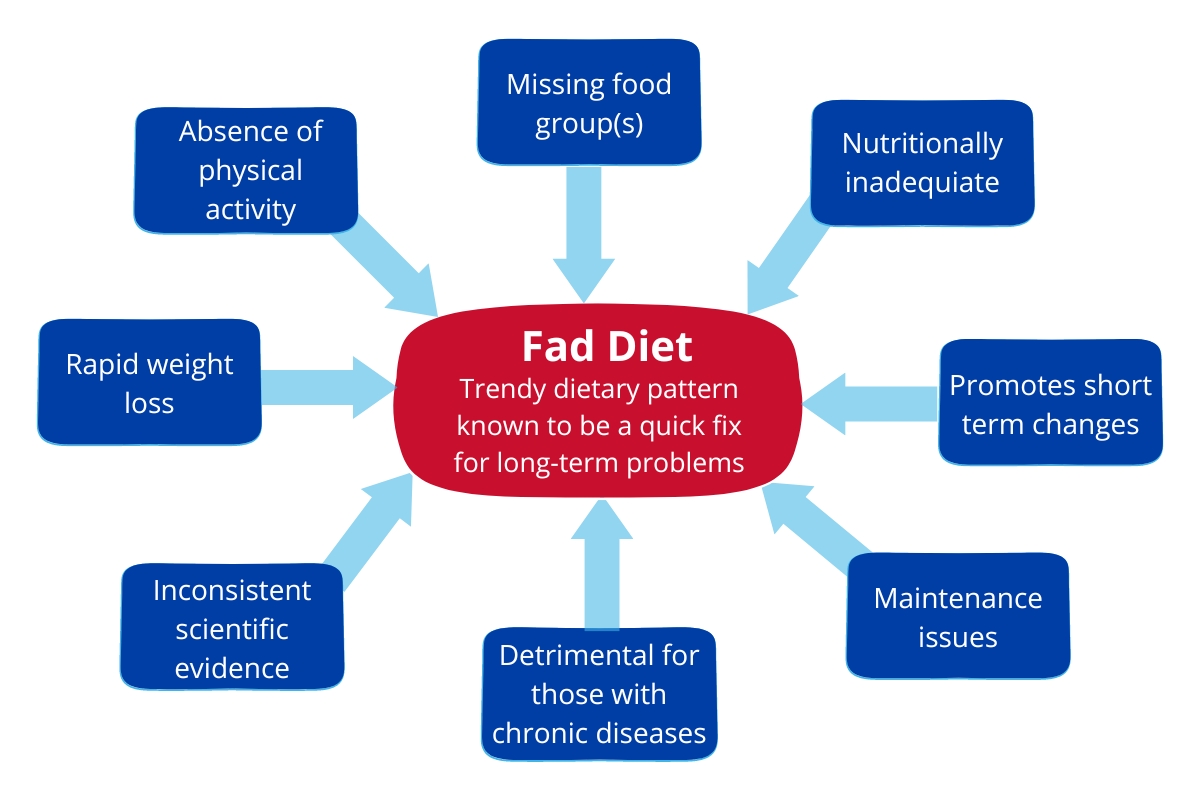'Fad Diets on the Table' by Firstmed Budapest
- 1 Jun 2023 4:17 PM

Then you read in the news or hear from your friend about a special eating plan out there that doesn’t require you to give up your favorite foods or go hungry! It may seem attractive at first because it offers a quick-fix approach to weight loss.
But if you want to lose weight, be careful about what dietary program you choose. Some can be healthy and balanced, but others may lead to nutritional deficiencies or side effects.
In our series of articles, we will examine the popular fad diets with our dietitian Izabella Henter. We’ll look at their risks and what factors people should consider when following them. In this first part, we will explore what makes fad diets so appealing to people.
What are fad diets and how to recognize them?
Fad diets are special eating plans that become very popular for a short period and then quickly fade away. Look closer at their main aspects and how to recognize them:
* Often based on a single idea or concept, which makes it easier to remember them.
* Promise quick results: make sweeping claims about the benefits of their particular approach—such as “lose 15 pounds (7 kgs) in 30 days” or “eat whatever you want and still lose weight.” Short-term weight loss plans are not sustainable and these can lead to increased body weight once you stop following the diet (the yo-yo effect).
* Require restrictive food choices: suggest eating certain foods together or in large quantities (such as meat, grapefruit, or cabbage soup) while restricting other groups of nutrients (like carbohydrates or fat). This causes meal monotony, leading to a poor, imbalanced diet.
* Offer special dietary products: makes you purchase special foods or take supplements like vitamin pills or meal replacements.
* Make unsupported claims without scientific evidence.
* Don’t emphasize physical activity: usually ignore the importance of physical activities in losing weight.
* Detox or cleanse: promote the idea of “detoxing” or “cleansing” the body by eliminating certain foods, following extreme eating patterns, or use of special products.
* Appeal to emotions: use emotional language in their promotion or testimonials to lure in consumers, rather than providing scientifically-backed information.
* One-size-fits-all approach: offer a single plan for everyone, disregarding individual differences in nutritional needs, health status, and lifestyle factors.

Are fad diets sustainable for long-term weight loss?
While fad diets may lead to quick weight loss, they’re usually not healthy or sustainable. In fact, many of them can cause dietary deficiency and other health problems that could lead to increased body fat in the long run.
Fad diets typically don’t address the behavioral factors that contribute to overeating and weight gain. This means that even if you lose weight, you will likely regain it once you stop following the diet plan.
What is still the best method to lose weight and keep it off?
Izabella Henter suggests not believing in diets promising rapid weight loss; they do not work. You’re better off going on a healthy eating plan and exercise program that will help you lose weight slowly but steadily.
The key is to keep a consistent pace, so it’s important to make changes in your lifestyle rather than just following a strict diet.
If you are looking for a way to lose weight, don’t hesitate to ask for the help of a dietitian, who can create a weight-loss plan tailored to your particular needs and goals.
A dietitian can give you advice and guidance that’s based on scientific evidence, so you’ll know how to lose weight safely. She can assess your current eating habits, lifestyle, and medical history and create a plan that promotes healthy weight loss and meets your special nutritional needs.
Stay tuned for our next article, where we will discuss some common examples of fad diets in detail.
Source: Firstmed Budapest





























LATEST NEWS IN specials